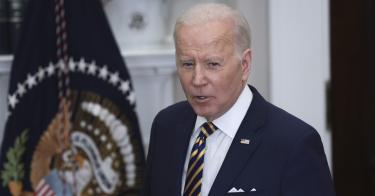War in Ukraine is causing many European leaders to rethink their views on national security. Germany, for example, announced it will start living up to its NATO defense spending commitments, send lethal arms to Ukraine and buy the F-35 jet fighter—all striking policy reversals. The United States, too, should resume treating its own national defense with the seriousness it deserves.
Thus far, the Biden administration has been profoundly unserious. Despite laws that require a new administration to publish national security and defense strategies within a year of taking office, both are missing in action. President Biden's Interim National Security Guidance, published last year, offered little insight as to the administration's defense priorities, other than to assure climate change activists of its commitment to their cause. The guidance mentioned "climate change" no less than 14 times, but omitted mention of the roles played by such quaint security institutions as the Army or Navy.
Some speculate Vladimir Putin's actions in Ukraine came as such a surprise to the administration that it was forced to revisit the fundamental assumptions underlying its draft security strategies, delaying their release. If that is indeed the case, one could argue the strategies were seriously flawed from the beginning. After the invasions of Georgia in 2008 and Ukraine in 2014, there should have been no illusions regarding Putin's malevolent intentions.
Although security officials have been unable to deliver the required security strategies, that does not mean they have not been busy. Indeed, in the first months of the administration, the Pentagon delivered a comprehensive "Climate Adaptation Plan," followed a few months later by the Army's "Climate Strategy," the first of its kind. Loaded with objectives and goals, these plans certainly display seriousness, just not about national security.
>>> The Situation in Ukraine Is Desperate—What the U.S. Should Do Immediately
When the overdue strategies do finally arrive, they will reportedly feature a heavy reliance on the vague concept of "integrated deterrence." In the words of Defense Secretary Lloyd Austin, that concept depends on "federal agencies, partner nations and allies" and involves "using every military and non-military tool in lock-step with allies and partners" to deter aggression from the likes of Xi Jinping and Vladimir Putin.
Unfortunately, we are witnessing the failure of "integrated deterrence" in Ukraine in real time. Even though nearly every European and American leader warned Putin of grave consequences if he invaded, he was undeterred. Biden now acknowledges the limits of sanctions, saying "No one expected the sanctions to prevent anything from happening."
In the end, we are left with the cold reality that autocrats such as Xi and Putin care little about economic sanctions, international condemnation or isolation. What matters for them is the likelihood of success of their military actions, whether in Kyiv or Taiwan.
Soviet dictator Joseph Stalin offered a glimpse into the autocratic frame of mind when he asked a close advisor, "How many divisions does the Pope have?" What is clear now is what we have always known: diplomacy is useful, and sanctions may bite, but the only reliable means to deter hostile regimes is to develop and maintain a strong military sufficient to counter their aggression.
Sadly, the U.S. military today is too small, under-trained and lacking in modernized equipment to deal with the challenges before it. The U.S. Navy is smaller than China's, the Air Force lacks enough modern aircraft and the Army is operating with equipment from the 1980s. Because defense budgets have failed to keep pace with inflation (highlighted by Biden's proposal to cap the 2022 defense budget below inflation), military leaders have been forced to choose between developing equipment for the next decade or maintaining current readiness. Most have made the painful decision to sacrifice their readiness to fight today.
>>> Answers to 6 Big Questions About Putin’s Nuclear Threats
Each of the military service branches are struggling to recruit enough Americans to fill their ranks. Given COVID-19, the lack of national leaders talking about public service and concern the military is becoming politicized, this should not come as a surprise. But failure to fix this problem will have profound consequences.
Military budgets must increase, with attention placed on making tangible improvements in readiness and capability—not in 15 years, but now. National leaders and key influencers alike must start speaking to America's youth about the virtues of serving their country.
Ukrainian President Volodymyr Zelensky called for his citizens to come to their country's defense, and they have. He and they understand what it means to stand in Putin's path. It is past time for Americans to acquire a similar seriousness about their security.
This piece originally appeared in Newsweek



